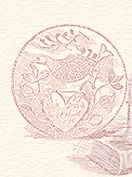Ihr liewe Leit:
Im Unser Pennsylvanisch-Deitscher Kallenner (1905) hot der
Kallennermann (der Henry A. Schuler, 1850-1908) fer der Dezember gschriwwe:
“In dem Munet warre die Daage als katzer un katzer, un die Owede
als lenger un lenger bis so um der 22. rum. Noh heesst’s Windersaafang im
Kallenner. Der Winder iss oftmols awwer schunn eender do; alsmol kann mer
schunn im November Schlidde faahre. Sell Schliddefaahre iss en groossi
Blessier wammer en schmaerder Gaul hot un ‘s iss gudi Baah.
“Die Buwe un Meed duhne noh als Paerdies uffmache, griege sich en
Zweegeilsfuhr un en Dreiwer, faahre aryets naus an en Wattshaus, un losse sich
en gut Sabber mache. Fer kammen gebt’s noh aa en Dans odder en Frallick dezu.
So gege Daag kumme sie widder heem.”
Ya, es scheint ass ver alders mer meh so Frallicks ghatt hot ass
wie heidichdaags. Es waar im Winder 1901/1902 ass der Solwell Files (der
Elwood Fischer, 1857-1921) en en Brief in Ellendauner Zeiding gschriwwe hot:
“Die Meed waarde all so arrig fer Schnee. Sie deede mol widder
gaerne Schlidde faahre. Sie sin des Drallifaahre leedich, un die Buwe ass en
Fuhr hen sin ihne nau widder gut genunk. Ich hab gelaabt so gingt’s.
“Awwer was ich saage
hab wolle vun der Schlidde-faahrerei. Was kann mer Fann hawwe mit ner hot. Do
kann mer die Blaenkets unner die Meed schtobbe, un sie greische net wann mer
bissel wedder sie kummt. Noh sin sie en bissel gfrore, un mer kann sie besser
handle.”
Fer der Henry L. Fischer (1822-1909) waar des Schliddefaahre aa en
grosser Gschpass, abbaddich wann er zu der Singschul gfaahre iss:
Im winder waar als Singenschul,
Im Schulhaus datt am Barg:
Datt sin mer als hie Schlidde gfaahre –
Un wann mer all beinanner waare,
Waar’s aartlich iwwerzwarg;
Ihr liewe Leit! O was! O was!
Waar seller guder alder Gschpass!
Ebmols iss’s iwwer’n Schtumbe gange,
Un hot uns all rausgschmisse;
Datt waare mer, im Schtroh un Shnee,
Drunner-un-driwwer, unnerm Schlee,
Un gaar nix waar verrrisse;
Hurra-a-a! was hen mer doch gelacht!
Es hot der Wald recht Schalle gemacht!
Heidichdags kumme sie glei middem Sals un Esch. Iss sell ferwas der
Schlidde nau en Blummeschtand im Hof iss!
Macht’s gut,
Der Alt Professer |
Dear people:
In Our Pennsylvania German (Dutch) Almanac (1905), the
Almanac Man (actually Henry A. Schuler, 1850-1908) wrote for the month of
December:
“During this month the days get shorter and ever shorter, and the
evenings longer and ever longer until about the 22nd. Then the beginning
of winter is indicated in the almanac. But winter is often here even
earlier; sometimes one can go sleighing already in November. That
sleighing is a great pleasure if one has a quick horse and there’s lots of
snow.
“The boys and girls get together parties, get themselves a
two-horse sleigh and a driver, drive somewhere out to an inn, and have
themselves a good supper made/cooked. Commonly there is also a dance or a
frolic. Towards daylight they come home again.”
Yes, it seems that in days of yore (well, at the turn of the
century anyway) we had many more frolics than we have today. It was the
winter of 1901/1902 that Solwell Files (actually Elwood Fischer,
1857-1921) wrote in a letter to an Allentown newspaper:
“The girls were waiting so much for snow. They would like to go
sleigh riding again. They are sick and tired of riding the trolley, and
the boys who have a carriage (together with horses, of course) are once
again good enough for them. I thought it would turn out that way.
“But what I wanted to day about sleigh riding. What fun you can
have while sleight riding if one has a good party/group together. You can
stuff the blankets under the girls, and they don’t yell/scream if you come
up against them a little bit. Then they are a little frozen, and you can
handle them better.”
For Henry L. Fisher (1822-1909) sleigh riding was also great fun,
especially when he drove his sleigh to the singing school:
In winter there used to be singing school,
In the schoolhouse there at the mountain;
We used to drive our sleighs there
And when we were all together
Things were quite befuddled;
Dear people! Oh, what! Oh, what!
Was all that good old fun!
Sometimes we drove right over stumps,
And threw all of us out;
There we were, in straw and snow,
Under-and-over, under the sleigh,
And nothing at all was torn;
Hurrah! How we laughed!
It made the forest/woods resound/echo!
These days they come right away with salt and ashes. Is that why
the sleigh is now a flower stand in the yard?
Take care,
The Old Professor |













